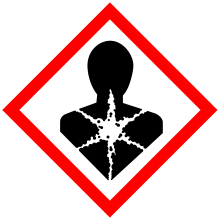Reproductive toxicity

Reproductive toxicity is a hazard associated with some chemical substances, that they will interfere in some way with normal reproduction. It includes adverse effects on sexual function and fertility in adult males and females, as well as developmental toxicity in the offspring.[1][2][3] It is usual to take a practical definition, including several different effects which are unrelated to each other except in their outcome of lowered effective fertility.[3] The Globally Harmonized System of Classification and Labelling of Chemicals (GHS) separates reproductive toxicity from germ cell mutagenicity and carcinogenicity, even though both these hazards may also affect fertility.[2]
One well known group of substances which are toxic for reproduction are teratogens – substances which cause birth defects – of which (S)-thalidomide is possibly the most notorious. Another group of substances which has received much attention (and some controversy) as possibly toxic for reproduction are the so-called endocrine disruptors.[4] However many substances which are toxic for reproduction do not fall into either of these groups: lead compounds, for example, are considered to be toxic for reproduction[5][6] given their adverse effects on the normal intellectual and psychomotor development of human babies and children.
Many drugs have effects on the human reproductive system: these may be desired (hormonal contraception), a minor unwanted side effect (many antidepressants) or a major public health problem (thalidomide). However most studies of reproductive toxicity has focussed on occupational or environmental exposure to chemicals and their effects on reproduction. It may be noted that both consumption of alcohol and tobacco smoking are known to be "toxic for reproduction" in the sense that the term is used here.
See also
References
- ↑ Annex I, section 3.7, Regulation (EC) No 1272/2008 of the European Parliament and of the Council of 16 December 2008 on classification, labelling and packaging of substances and mixtures, amending and repealing Directives 67/548/EEC and 1999/45/EC, and amending Regulation (EC) No 1907/2006. OJEC, L353, 31.12.2008, pp. 1–1355, at pp. 107–14.
- ↑ 2.0 2.1 Part 3, chapter 3.7, Globally Harmonized System of Classification and Labelling of Chemicals (Second revised ed.), New York and Geneva: United Nations, 2007, pp. 175–86, ISBN 978-92-1-116957-7, ST/SG/AC.10/30/Rev.2.
- ↑ 3.0 3.1 International Programme on Chemical Safety (2001). "Principles For Evaluating Health Risks To Reproduction Associated With Exposure To Chemicals". Environmental Health Criteria (Geneva: World Health Organization) 225.
- ↑ International Programme on Chemical Safety (2002). "Global assessment of the state-of-the-science of endocrine disruptors". Geneva: World Health Organization. WHO/PCS/EDC/02.2
- ↑ Commission Directive 2004/73/EC of 29 August 2004 adapting to technical progress for the 29th time Council Directive 67/548/EEC on the approximation of the laws, regulations and administrative provisions relating to the classification, packaging and labelling of dangerous substances. OJEC L152, 30.04.2004, pp. 1–311 (index no. 082-001-00-6).
- ↑ Regulation (EC) No 1272/2008 of the European Parliament and of the Council of 16 December 2008 on classification, labelling and packaging of substances and mixtures, amending and repealing Directives 67/548/EEC and 1999/45/EC, and amending Regulation (EC) No 1907/2006. OJEC L353, 31.12.2008, pp. 1–1355 at p. 444 (index no. 082-001-00-6).